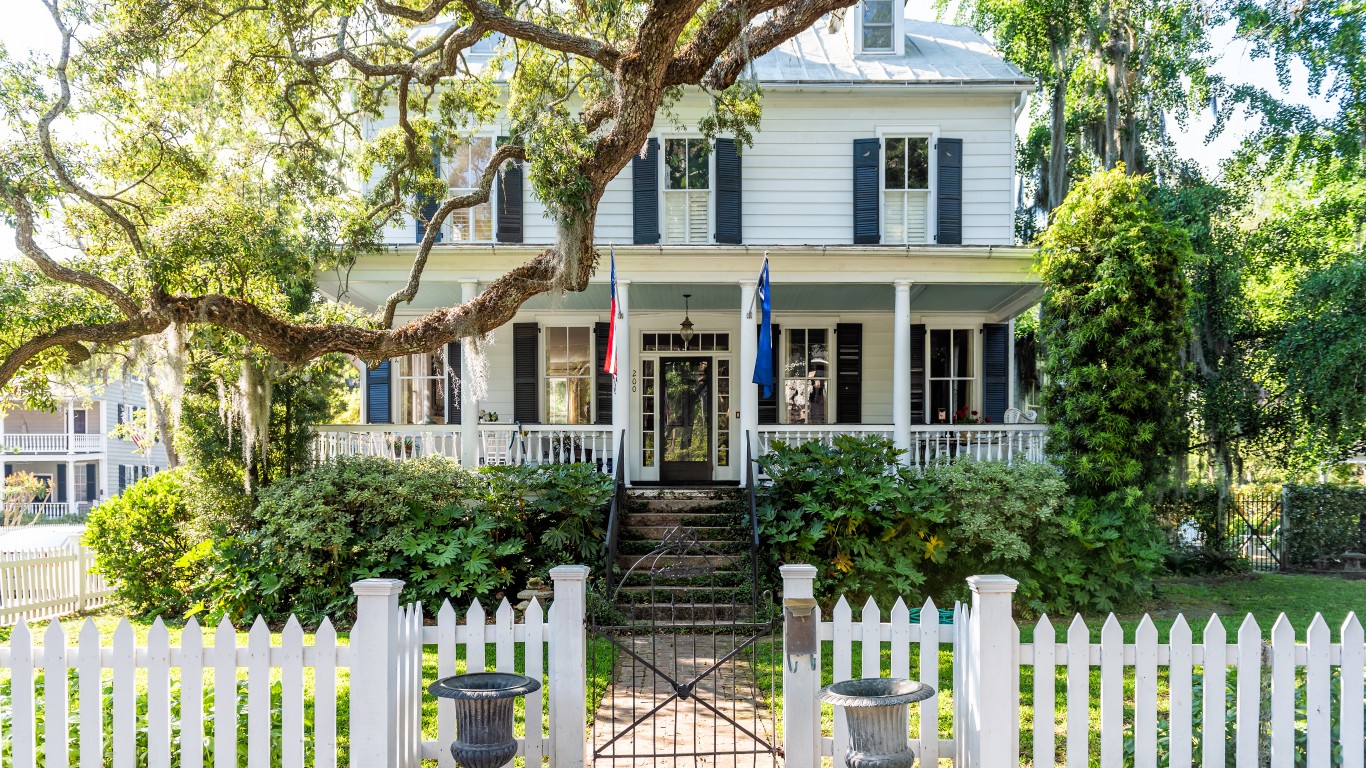

For many, homeownership is the cornerstone of the American Dream. As of January 2021, a typical single-family home in the United States costs $269,039. Of course, home values are not uniform across the country, and in some states, the typical home costs far more than the national average — while in others, homes cost far less.
According to estimates from Zillow, a Seattle-based real estate data company, the value of a typical single-family home in Oklahoma is $141,933, about 47% lower than the national average.
Housing prices are determined by supply and demand forces as well as what local residents are willing to pay — and that is influenced largely by what they can afford. As a result, areas with higher than average home values often also have higher-income residents. Oklahoma is no exception. The typical household in the state earns $54,449 annually, $11,300 less than the national median household income of $65,712.
Just as home values are lower than average in Oklahoma, the overall cost of living is too. The average cost of goods and services across the state are 11.6% less than they do nationwide, on average.
Across Oklahoma, home values are climbing at a relatively slow pace. The value of a single-family home across the state increased by 7.21% over the one year period from January 2020 to January 2021, 1.91 percentage points slower than the average national one-year home value appreciation of 9.12%.
| State: | Value of a typical single-family home: | 1-yr. increase in home value: | Median household income: |
|---|---|---|---|
| Hawaii | $683,470 | 4.7% | $83,102 |
| California | $624,977 | 10.5% | $80,440 |
| Massachusetts | $474,673 | 10.4% | $85,843 |
| Washington | $470,304 | 12.7% | $78,687 |
| Colorado | $442,766 | 8.6% | $77,127 |
| Oregon | $402,573 | 10.0% | $67,058 |
| Utah | $401,053 | 13.3% | $75,780 |
| New Jersey | $376,866 | 10.6% | $85,751 |
| New York | $350,545 | 7.7% | $72,108 |
| Idaho | $348,483 | 18.9% | $60,999 |
| Maryland | $341,148 | 8.5% | $86,738 |
| Rhode Island | $340,811 | 11.9% | $71,169 |
| Nevada | $332,501 | 8.6% | $63,276 |
| New Hampshire | $330,976 | 12.4% | $77,933 |
| Montana | $324,813 | 9.8% | $57,153 |
| Arizona | $315,554 | 16.5% | $62,055 |
| Virginia | $307,964 | 7.8% | $76,456 |
| Alaska | $292,066 | 0.6% | $75,463 |
| Connecticut | $288,822 | 11.5% | $78,833 |
| Delaware | $284,787 | 9.6% | $70,176 |
| Minnesota | $283,127 | 8.0% | $74,593 |
| Vermont | $277,364 | 6.1% | $63,001 |
| Maine | $276,023 | 12.3% | $58,924 |
| Florida | $270,560 | 8.6% | $59,227 |
| Wyoming | $262,517 | 3.6% | $65,003 |
| North Dakota | $239,464 | 2.7% | $64,577 |
| New Mexico | $229,947 | 11.0% | $51,945 |
| North Carolina | $225,740 | 9.3% | $57,341 |
| South Dakota | $225,662 | 5.7% | $59,533 |
| Texas | $224,466 | 7.5% | $64,034 |
| Georgia | $223,945 | 9.2% | $61,980 |
| Illinois | $219,806 | 6.2% | $69,187 |
| Pennsylvania | $215,939 | 9.6% | $63,463 |
| Wisconsin | $213,537 | 9.6% | $64,168 |
| Tennessee | $207,727 | 10.3% | $56,071 |
| South Carolina | $206,647 | 7.9% | $56,227 |
| Nebraska | $192,584 | 7.4% | $63,229 |
| Michigan | $192,093 | 9.9% | $59,584 |
| Missouri | $180,253 | 9.1% | $57,409 |
| Louisiana | $178,987 | 4.5% | $51,073 |
| Indiana | $172,769 | 9.3% | $57,603 |
| Ohio | $168,226 | 10.4% | $58,642 |
| Kansas | $167,540 | 8.1% | $62,087 |
| Kentucky | $160,589 | 7.5% | $52,295 |
| Iowa | $158,930 | 3.6% | $61,691 |
| Alabama | $158,809 | 8.9% | $51,734 |
| Arkansas | $142,070 | 6.7% | $48,952 |
| Oklahoma | $141,933 | 7.2% | $54,449 |
| Mississippi | $134,125 | 4.8% | $45,792 |
| West Virginia | $113,626 | 4.7% | $48,850 |
This is How Much Home You Can Buy For 200K in Every State
Essential Tips for Investing: Sponsored
A financial advisor can help you understand the advantages and disadvantages of investment properties. Finding a qualified financial advisor doesn’t have to be hard. SmartAsset’s free tool matches you with up to three financial advisors who serve your area, and you can interview your advisor matches at no cost to decide which one is right for you. If you’re ready to find an advisor who can help you achieve your financial goals, get started now.
Investing in real estate can diversify your portfolio. But expanding your horizons may add additional costs. If you’re an investor looking to minimize expenses, consider checking out online brokerages. They often offer low investment fees, helping you maximize your profit.
Thank you for reading! Have some feedback for us?
Contact the 24/7 Wall St. editorial team.



